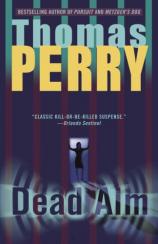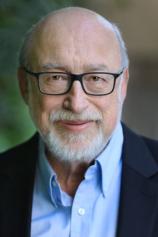Dead Aim
Review
Dead Aim
As we scramble to cope in a world imploding from violence, self-defense training has become as common as swimming lessons and drivers education. Women of all ages are attending classes in marital arts and increasing numbers of citizens are arming themselves and heading for shooting ranges. In Thomas Perry's fertile mind, it follows that some savvy entrepreneur might market the ultimate self-defense experience, a sort of pseudo-military resort, in which the insatiable rich can reap the practical skills to thwart potential assaults and the bragging rights to the hottest trend within their social circle. It is this camp --- The Safe-Force School of Self-Defense --- that becomes the center of the concentric ripples of violence in Perry's latest mind-blowing thriller, DEAD AIM.
After the initial murder scene hits you straight between the eyes, the story switches cadence with the protagonist, Robert Mallon, rescuing a young woman from an attempted suicide on a California beach. After the intimacy of their encounter, Mallon is stunned when the young woman kills herself a few days later. Ridden with guilt because he wasn't able to dissuade her, he becomes obsessed with learning why Catherine Broward felt driven to end her life. Mallon hires Lydia Marks, a private investigator and former law enforcement colleague, to help him sort through the troubled woman's past. They soon discover Catherine had been romantically involved with a man whose unsavory alliances may have resulted in his murder --- the murder that we're witness to in the opening pages of DEAD AIM. Was Catherine running in fear of those same assassins that murdered her boyfriend? It seems like a plausible explanation, particularly when it is revealed that she spent the previous month attending an exclusive self-defense school hidden away in the hills above Santa Barbara. But the police are uninterested in reopening the case and the school's headmaster refuses to reveal information about his students, forcing Mallon and Marks to dig deeper into Catherine's puzzling life. When Mallon suddenly becomes the target for a group of unknown assassins, it appears that his benevolent intentions are unearthing a much darker secret, affirming his preliminary theory that Catherine's death may not have been a simple suicide.
The fundamental storyline alone would make DEAD AIM a compelling novel, but it's Perry's originality that puts him head and shoulders above mainstream thriller writers. Not content to examine one central character from all of his or her angles, Perry probes the multiple minds of protagonists and antagonists with a precision that eliminates the usual extraneous detail and ignites the reader's speculation. Michael Parish, master of the self-defense school, is unnervingly evil and manipulative; his dedicated staff a cross-section of intelligent, highly skilled misfits. All come complete with a sufficiently murky background, a lack of moral conscience and a frightening thirst for violence. As Perry's underlying premise of The Safe-Force School takes a leap into the scarier extremes of what humans are capable of, the plausibility of his masterful fiction is thought provoking and disturbing.
Robert Mallon seems, by contrast, the more comfortable composite of ordinary emotions. His obsession with Catherine's suicide is driven by a personal despair --- the type of tragic life experience that leaves wounds that never heal. He reflects our own frustrations in trying to grapple with events that are out of our control and the inevitable rage that results when we try to and fail. The only troubling question for readers may be in rationalizing the Samaritan turned aggressor in the final confrontation. Some reviewers have found this to be a weakness in Perry's otherwise well-crafted storyline. This reviewer believes they've missed the point entirely.
While Thomas Perry's remarkable body of work continues to inspire many notable writers whose names frequent the bestseller lists, his name has remained relatively unknown to the reading masses. His Jane Whitefield series has recently broadened his audience with the happy result that some of his earlier out-of-print novels will soon be reissued. What is his reasoning for eschewing the limelight? "It has always seemed to me that the least interesting thing about a book was its author." With sincere apologies to Mr. Perry, I've continuously done my best to undermine that philosophy in the last several years. So if you haven't yet discovered the brilliance of Thomas Perry, his latest thriller, DEAD AIM, is an excellent place to start.
Reviewed by Ann Bruns on January 21, 2011





